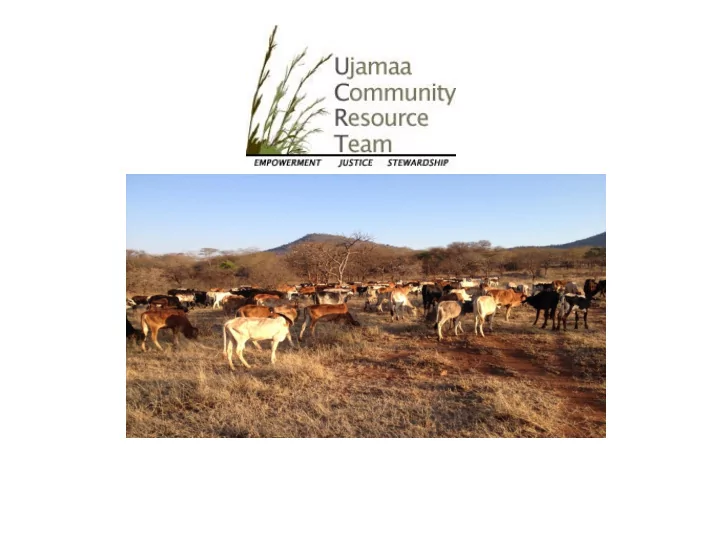

Ujamaa Community Resource Team (UCRT) • UCRT is a non-profit environmental and social justice organization, which works with indigenous groups of different cultures. The target communities are those who depend on communal resource management regimes to support their livelihood. • The organization operating northern part of Tanzania, East Africa. • UCRT is the member of Europe lobbying group for pastoralists call CELEP which provided significant support to us through European Parliament resolution on Tanzania, notably the issue of land grabbing (2015/2604(RSP)
Village Land Use Planning • The Village Land Act enhances the security of Pastoral land tenure. This is particularly the case given the fact that land use planning (which takes into account indigenous knowledge and ecological needs) reduces/eliminates land use conflicts between different categories of land users. It also minimizes land degradation caused by inappropriate land use.
Cont…..
The local community Land insecurity • Increasing agricultural and commercial land values, deteriorating quality of governance, and a growing human population are all factors contributing to heightened pressures on community lands and an increasing level of rural land tenure insecurity in Tanzania as well as in much of eastern Africa today.
Land Tenure Security • Land Act No. 4 and Village Land Act No. 5 of 1999 attempted to strengthen community rights over land by clearly recognizing rural communities’ customary rights to use and manage their land. • The Village Land Act designated Village Councils as managers of “Village Lands”– the lands within the boundaries of a registered village – who are accountable to the Village Assembly for land use and allocation decisions. • The Village Assembly consists of every ordinary resident in the village who is at least 18-years of age. They elect village officials, such as members of the Village Council.
TZ Land Titling Tanzanian law provides two basic frameworks for both individuals and groups to secure their land tenure; • The first is a statutory or Granted Right of Occupancy, which the Land Act defines as ‘General Lands’. Most private lands and land in urban areas are held under such rights. • The second, which is what the majority of land in Tanzania is subject to, is Customary Rights of Occupancy, which are rights exercised through the organs of local governance administration, namely Village Councils and Village Assemblies.
Conclusion; • As pressures for lands across Tanzania increase and as fragmentation of rangelands continues to take place, avenues to secure rangelands and communal lands for pastoralists and for Tanzanians more generally are needed.
Recommendation The appropriate approach to overcome the below key obstacles that hinder local communities land rights tenure in Tanzania is needed. • Conflict of laws and policies wildlife Act Vs village land Act • The effect of top down approach in development. Lack of real and effective decentralization process. • Investment Vs livelihood. • Conflict of interest e.g. Pastoralism Vs Agriculture • High level of corruption and political interference • Limited resources to respond numerous human demands/scarcity • High level of poverty. • Economic development against Pastoralists Rangeland e.g. Lake Natron Soda ash program and other big agriculture investment and lodges construction in rangelands.
THANK YOU! Edward Loure Ujamaa Community Resource Team (UCRT) Email; director@ujamaa-crt.org www.ujamaa-crt.
Recommend
More recommend